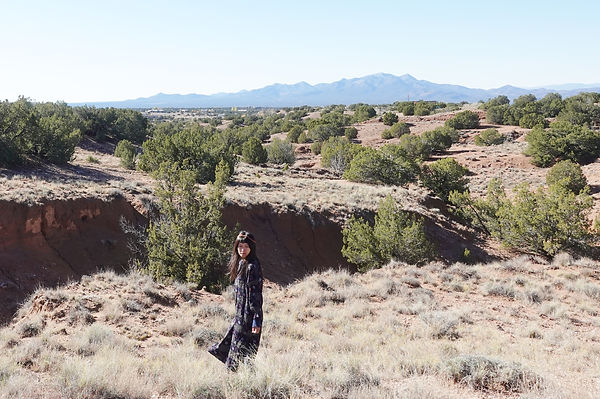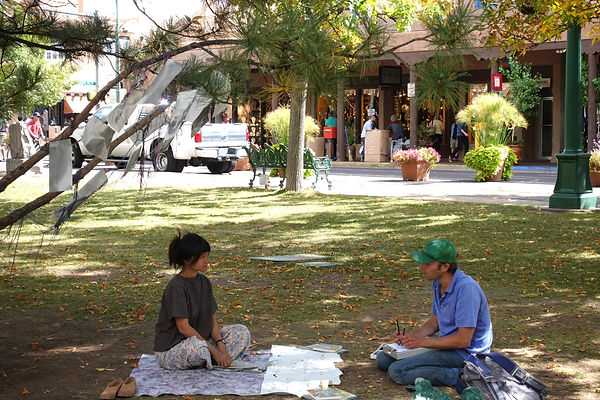
The Forgetting of Form
Author: Yu-Hsuan Wu
Publisher: Self-published
Year: 2019
Language: Bilingual (Chinese-English)
Pages: 146
ISBN: 978-957-43693-4-8
【About the Book】
To approach the wilderness of nature—and the wilderness at the edge of her own creative limits—Yu-Hsuan Wu traveled to Santa Fe, the capital of New Mexico, for an artist residency. Afraid of comfort and abundance, she repeatedly turned away from the known and fertile, rushing instead toward the unknown, the wild, the hollow. “In the face of desert and darkness,” she writes, “I waited for every word to dissolve its meaning. I could break apart—break even further. Between everything and nothing, I gradually took shape. In rare moments, the first word would emerge.”
Confronted by vast and open wilderness, one must shed the self and forget form, in order to search for new conditions of dwelling. With nothing to lean on, one must re-name the world. From her first poetry collection Exchanging Lover’s Ribs to this hybrid work of photography, poetry, and prose, The Forgetting of Form continues Wu’s pursuit of a writing mode inseparable from survival itself. To “forget form” is not to deny or erase the body, but to transcend its confines and see beyond the pre-assigned boundaries between self and object. Wu remains vigilant in her tether to the world, refusing to obscure the shifting, mysterious real with the illusion of fixed meaning.
【Author’s Note】
In our red-brick house, the front door leads to a green hedge, and the back door opens to a blue yard. Wherever you go, you are encircled. Before I left Taiwan, I remember reading Don Juan’s description of how Native Americans would go to the base of a cliff surrounded by rocks. Once there, they would slowly gather twigs and build a natural cage filled with wood, leaves, and earth. They would lie down on the ground facing east and spend the night alone.
To bury oneself inside that circle symbolized a cleansing of the inconsequential—a practice of centering and letting go at once, in order to return to the mind of the warrior. The next day, before leaving, they would dismantle the cage, return the earth to where it once was, and scatter the twigs on the shrubs and the leaves inside the circle to erase the trace of human presence.
During the three months I spent in Santa Fe as a resident artist, I too hoped to be encircled by nature and to withdraw from the outside world, so I could nourish my spirit. Afterward, I would cover up the signs of my existence and return to the world I had left—like a new person, as if I had never been gone at all.
【Selected Works】
A Street Stall
I dipped a twig in ink and wrote these words, then sat beneath a tree and set up my street stall:
“Memory and hope ask us to promise them a future.
Let me write you a poem, so memory and hope will not perish.”
A girl asked, “Why are you setting up a stall here?” I said, “It feels like everyone’s life can be absorbed by this plaza without being distorted. So I picked a tree I liked and sat beneath it to write poems.” She asked again, “What do you want strangers to say to you?” I said, “I don’t know. But probably the things they think aren’t important—yet still occupy their hearts.”
A man came without saying a word. He held a pen in each hand and began to draw me. I watched my face gradually take shape through the quick sketches of both his hands. So I began to write a poem for his two hands. I wrote, His two wings stir a wind from somewhere deep,
flying and flying—not to arrive, just to fly. When he pauses, we’ll exhale softly. No one can make a louder sound when truth reveals its form.
He smiled, took out a new piece of paper, and began drawing a map of the United States using both his left and right hands. He drew every state, every major city. At the far right corner of the map, his two hands outlined a tiny triangle. He shaded it in again and again, and said, “I was born right here. And like you said, I’ve kept flying, drawing wherever I go—not wanting to stop wandering.”
Another man came. He asked, “If there were no language, how would you know my story?” I said, “Everything about you is a language. Your spirit will show through your eyes.” Then I began writing a poem:
“While we are sleeping, language is awake.
The moment we come closest to it is when we wake up and forget our name.”
I read it once to him in English. He asked me to read it again in Chinese. I read it slowly, word by word. He said he could hear something beyond the words—something perhaps raw and universal, a feeling shared by all humans. I told him I’m intentionally not teaching my child to speak. I hope my child won’t start life trapped in the language systems we’ve already invented. Once we call a piece of paper ‘paper,’ we stop searching. I want my child to be able to rediscover everything in each moment, with no preexisting language or ideas standing between him and the thing itself.
Rain began to fall. He helped me pack up the stall and asked for my name. I said, “Frida.” He said he was a craftsman from Mexico. “Next time I see you,” he said, “I’ll give you a necklace, just like the one Frida Kahlo wore around her neck.” Then he crouched down and walked backwards, waving both hands. My son ran forward, chasing after those hands as if they were butterflies. And so the two of them had the longest goodbye.
【Review & Reflection】
“What sets The Forgetting of Form — Sketches from My Residency at Santa Fe apart is its seamless coexistence of tenderness and thought. As Yu-Hsuan Wu probes deeper into questions of education and human civilization, she also continues to caress the depths of emotion. Reason and feeling are not dissonant or contradictory—they are simply different expressions of the same human blueprint.”
—Shen Mian, “Descending the Dark Staircase: Reading Yu-Hsuan Wu’s Escape and The Forgetting of Form”
【Exhibition Log】
Once a month, the Santa Fe Art Institute opens its studios to the public. That morning, I arrived early to prepare mine. Nora leaned in and asked how the drawings on my wall were made. “I didn’t do anything,” I told her. “The ink poured into water drew them on its own.” She said it gave her inspiration. Later, she crumpled sheets of paper, let the paint run, and discovered a new way to display her documents.
I filled my walls with raw drafts of my writing. In several corners, I hung purplish-blue cotton threads—the same ones I’d used during the months I ran a street stall in Santa Fe’s central plaza. The ends of the threads had long disappeared, leaving only clumps of hopeless knots. They reminded me of myself. So I left them as they were—messy and unresolved—pinning fragments of poems and photographs onto the threads.
Longing for a disruption beyond myself, I stepped out into the biting cold. Along the roadside, I met a man bent over, cutting mountain sage. “Where’s your dog?” I asked. He looked up, recognized me, and smiled. “In that corner,” he said. As I began to walk away, he teased, “Why aren’t you helping me?” I moved toward him, and he laughed. “Just kidding.”
He picked up a dried branch, pressed it to his nose, and inhaled deeply. “Have you ever smelled this?” he asked. “It’s fragrant.” I crouched to pick one up. The scent of wild earth seized me instantly. I gathered a few more of the sprigs he’d cut. “Thank you,” I said. “You’ve just given me inspiration. My exhibition needs their scent.” He beamed. “Take them all.” I turned back and shouted, “No need! Just a little is enough—to recall the whole wilderness.”


